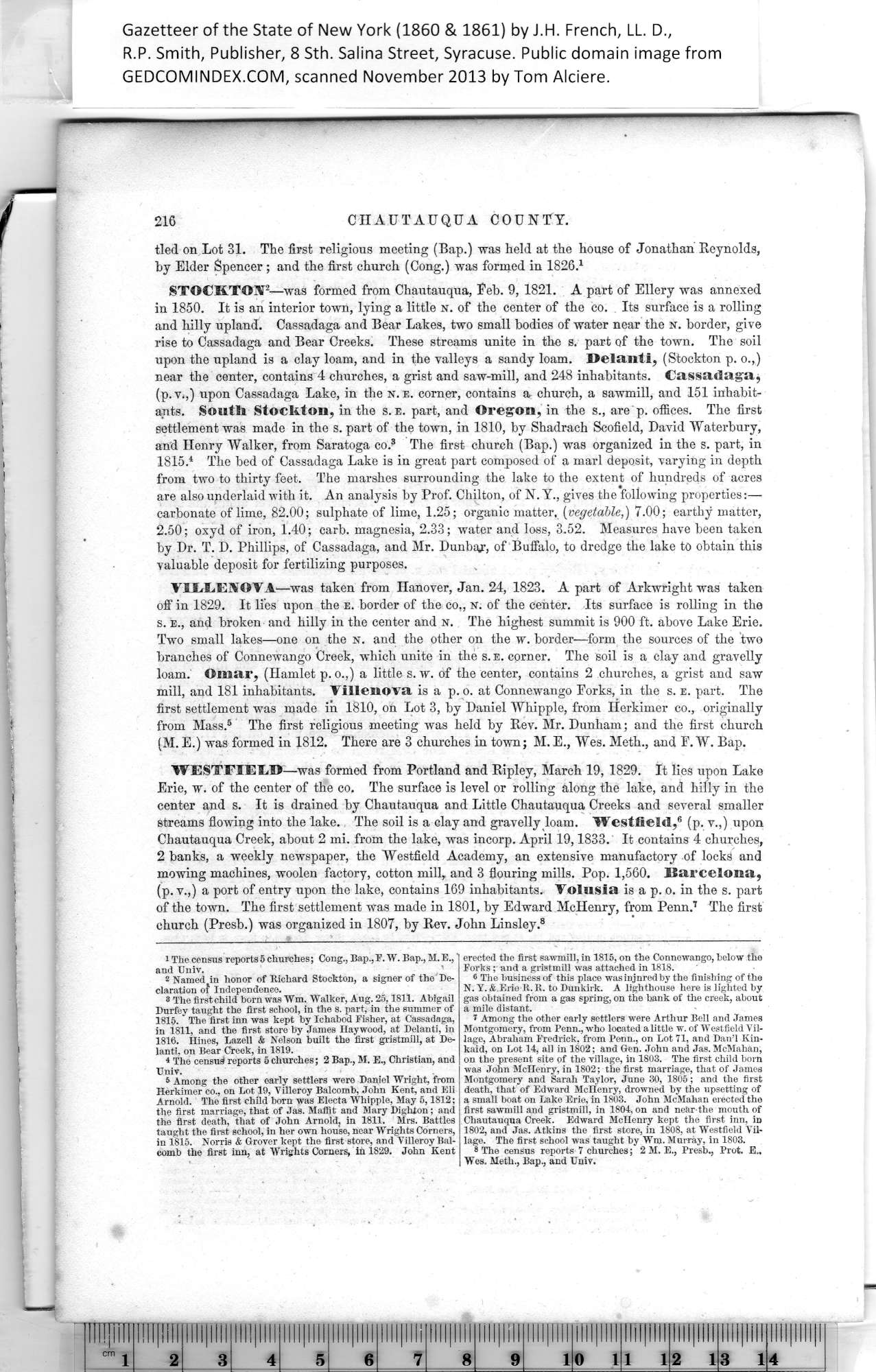|
216 CHAUTAUQUA COUNTY.
tied on Lot 31. The first religious meeting (Bap.) was held at the house of Jonathan Reynolds,
by Elder Spencer ; and the first church (Cong.) was formed in 1826.1
STOCKTON2—was formed from Chautauqua, Eeb. 9, 1821. A part of Ellery was annexed
in 1850. It is an interior town, lying a little n. of the center of the co. Its surface is a rolling
and hilly upland. Cassadaga and Bear Lakes, two small bodies of water near the n. border, give
rise to Cassadaga and Bear Creeks. These streams unite in tho s. part of the town. The soil
upon the upland is a clay loam, and in the valleys a sandy loam. DehUiB, (Stockton p. o.,)
near the center, contains 4 churches, a grist and saw-mill, and 248 inhabitants. Cassadaga,
(p.v.,) upon Cassadaga Lake, in the n.e. corner, contains a church, a sawmill, and 151 inhabit¬
ants. South stocllton, intbe s.e. part, and Oregon, in the s., are p. offices. The first
settlement was made in the s. part of the town, in 1810, by Shadrach Scofield, David Waterbury,
and Henry Walker, from Saratoga co.3 The first church (Bap.) was organized in the s. part, in
1815J The bed of Cassadaga Lake is in great part composed of a marl deposit, varying in depth
from two to thirty feet. The marshes surrounding the lake to the extent of hundreds of acres
are also underlaid with it. An analysis by Prof. Chilton, of N. Y., gives the following properties;—
carbonate of lime, 82.00; sulphate of lime, 1.25; organic matter, (vegetable,) 7.00; earthy matter,
2.50; oxyd of iron, 1.40; carb. magnesia, 2.33; water and loss, 3.52. Measures have been taken
by Dr. T. D. Phillips, of Cassadaga, and Mr. Dunbar, of Buffalo, to dredge the lake to obtain this
valuable deposit for fertilizing purposes. ,
TILLEDOVA—was taken from Hanover, Jan. 24, 1823. A part of Arkwright was taken
off in 1829. It lies upon the e. border of the co,, n. of the center. Its surface is rolling in the
s. e., and broken and hilly in the center and n. The highest summit is 900 ft. above Lake Erie.
Two small lakes—one on the n. and the other on the w. border—form the sources of the two
branches of Connewango Creek, which unite in the s. e. corner. The soil is a clay and gravelly
loam. Omar, (Hamlet p.o.,) a little s. w. of the center, contains 2 churches, a grist and saw
mill, and 181 inhabitants. Villenova is a p. o. at Connewango Forks, in the s. e. part. The
first settlement was made in 1810, on Lot 3, by Daniel Whipple, from Herkimer co., originally
from Mass.5 The first religious meeting was held by Rev. Mr. Dunham; and the first church
(M. E.) was formed in 1812. There are 3 churches in town; M.E., Wes. Meth., and F.W. Bap.
WESTFIERD—was formed from Portland and Ripley, March 19, 1829. It lies upon Lake
Erie, w. of the center of the co. The surface is level or rolling along the lake, and hilly in the
center and s. It is drained by Chautauqua and Little Chautauqua Creeks and several smaller
streams flowing into the lake. The soil is a clay and gravelly loam. Westfield,3 (p. v.,) upon
Chautauqua Creek, about 2 mi. from the lake, was incorp. April 19,1833. It contains 4 churches,
2 banks, a weekly newspaper, the Westfield Academy, an extensive manufactory of locks and
mowing machines, woolen factory, cotton mill, and 3 flouring mills. Pop. 1,560. Barcelona,
(p.v.,) a port of entry upon the lake, contains 169 inhabitants. Volusia is a p. o. in the s. part
of the town. The first settlement was made in 1801, by Edward McHenry, from Penn.4 The first
church (Presb.) was organized in 1807, by Rev. John Linsley.5
|
erected the first sawmill, in 1815, on the Connewango, below the
Forks ; and a gristmill was attached in 1818.
6 The business of this place wasinjnredby the finishing of the
N. Y. & .Erie R. R. to Dunkirk. A lighthouse here is lighted by
gas obtained from a gas spring, on the bank of the creek, about
a mile distant.
1 Among the other early settlers were Arthur Bell and James
Montgomery, from Penn., who located alittle w. of Westfield Vil¬
lage, Abraham Fredrick, from Penn., on Lot 71, and Danl Kin-
kaid, on Lot 14, all in 1802; and Gen. John and Jas. McMahan,
on the present site of the village, in 1803. The first child born
was John McHenry, in 1802; the first marriage, that of James
Montgomery and Sarah Taylor, June 30, 1805; and the first
death, that of Edward McHenry, drowned by the upsetting of
a small boat on Lake Erie, in 1803. John McMahan erected the
first sawmill and gristmill, in 1804, on and near the mouth of
Chautauqua Creek. Edward McHenry kept the first inn, iD
1802, and Jas. Atkins the first store, in 1808, at Westfield Vil¬
lage. The first school was taught by Wm. Murray, in 1803.
8 The census reports 7 churches; 2 M. E., Presb., Prot. E„
Wes. Meth., Bap., and Univ. |
1
The census reports 5 churches; Cong., Bap., F. W. Bap., M. E.,
and Univ. '
2
Named in honor of Richard Stockton, a signer of the De¬
claration ol Independence.
3
Among the other early settlers were Daniel Wright, from
4
Herkimer co., on Lot 19, Yilleroy Balcomb, John Kent, and Eli
Arnold. The first child horn was Electa Whipple, May 5,1812;
the first marriage, that of Jas. Maflit and Mary Dighton; and
the first death, that of John Arnold, in 1811. Mrs. Battles
taught the first school, In her own house, near Wrights Corners,
in 1815. Norris & Grover kept the first store, and Yilleroy Bal-
5
eomb the first inn, at Wrights Corners, in 1829. John Kent
|
